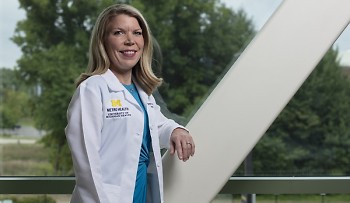Metro Health – University of Michigan Health is the first hospital in West Michigan, and second in the state of Michigan, to offer patients intensive cardiac rehab using the Pritikin ICR™ program. The program helps patients who have had a cardiac event, live a heart-healthier lifestyle.
Heart disease remains the leading cause of death for both men and women in the United States—more than all forms of cancer and chronic lower respiratory disease combined. This, despite advances in surgeries/procedures and prescribed medication. The reason is the difficulty in addressing the third component—lifestyle change—according to the American Heart Association.
Metro Health’s 5,000-square-foot space addresses that lifestyle component. It comes complete with state-of-the-art exercise equipment as well as a kitchen where healthy cooking classes are held weekly. Nine cardiologists, six exercise physiologists, a nurse and a dietician comprise a robust staff supervised by cardiologist Barbara A. Karenko, DO.
“The Pritikin ICR™ program is a powerful tool for us, as cardiologists, to refer our patients to,” Karenko says. “No other modality has the ability, without medication and without surgery, to heal the patient as quickly and completely as intensive cardiac rehab.”
The Pritikin ICR™ program is tailored to those who have suffered cardiovascular events, including heart attack, angioplasty and stents, bypass or valve surgery, angina/chest pain, cardiac transplant or heart failure. Melissa Cook, Cardiovascular Rehabilitation Program Coordinator, explains that what makes this program unique is the number of educational sessions offered. Traditional programs only offer up to 36 sessions, while Metro Health’s is a 72-session program. “These sessions are a mix of exercise, individual education and group workshops, tailored to each patient needs, which address lifestyle behaviors, hands-on cooking, stress management, increased exercise capacity and quality of life.”
Cook goes on to say that patients entering the program are given more than just reading materials and basic information. Instead, they become part of a comprehensive care program developed by a multi-disciplinary team. In the program, patients aren’t simply handed a list of healthy foods to eat, they are taught how to read labels, go grocery shopping, and how to incorporate ingredients into healthy, good-tasting meals. “It’s really about helping patients understand barriers and how to overcome them to succeed,” she notes.
Since Metro Health’s expanded program launched in February, Cook reports remarkable success stories. Their current intensive cardiac rehab program has the highest compliance rank in the nation with a 70 percent graduation rate. (The Pritikin national average graduation rate for intensive cardiac rehab is currently 39 percent.)
Benefits of cardiac rehab include:
- Improving strength, endurance and physical function
- Increasing quality of life
- Lessening chance of another heart attack
- Controlling heart disease symptoms such as chest pain or shortness of breath
- Stopping or reversing damage to blood vessels in the heart
- Improving ability to perform daily activities
The Pritikin ICR™ program at Metro Health includes:
- Individualized treatment plans
- EKG monitoring during supervised exercise sessions
- Heart-healthy nutrition and cooking classes
- Cholesterol, blood pressure and diabetes monitoring and control
- Weight and stress management
- Tobacco cessation
- Risk modification education classes for patients and family members
Recent studies have shown that people who complete a cardiovascular rehab program can increase their life expectancy up to five years. “Committing to a comprehensive rehab program is just as important to patients’ recovery as their medical treatment and medicine, and can lead to a life that is much healthier and happier,” Karenko concludes.
The Rapidian, a program of the 501(c)3 nonprofit Community Media Center, relies on the community’s support to help cover the cost of training reporters and publishing content.
We need your help.
If each of our readers and content creators who values this community platform help support its creation and maintenance, The Rapidian can continue to educate and facilitate a conversation around issues for years to come.
Please support The Rapidian and make a contribution today.

